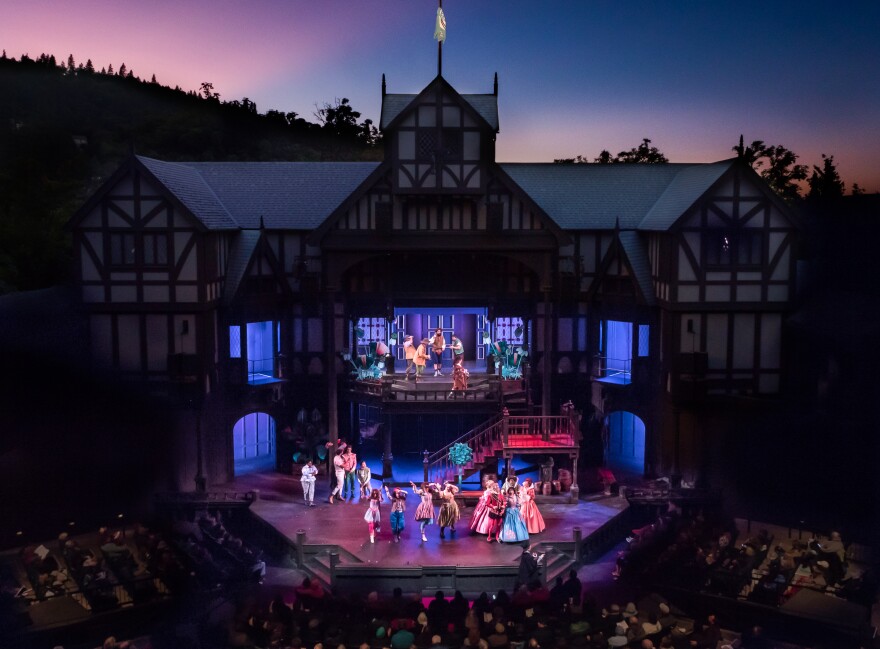It seems that London theatres are not expected to open until 2021, and that productions of large-scale shows such as musicals may be delayed even further: the world of theatrical performance does not lend itself to social distancing, not for audiences. Do we wait in line to enter and to leave the theatre, like boarding and disembarking a plane but keeping six feet apart at all times? And how would this work for performers? Would we find Romeo and Juliet in twin beds at opposite sides of the stage?
Furthermore, there is likely to be concern as to whether it is really safe to go to public events once more, even if such events are allowed to take place. There were some who felt uneasy about returning to the workplace after lockdown.
It seems very likely that, had the OSF theatres not closed as early as they did, the risk of people in our region being affected by the coronavirus would have increased greatly.
Will there be similar fears about returning to the theatre? Oddly enough, during the devastating flu epidemic of 1918, there were calls to keep theatres open to boost morale. Ultimately, they were closed, along with churches and schools—but bars and restaurants stayed open.
OSF began shutting down its operations on March 12, somewhat before all Oregon theatres were required to close. This was a brave decision, and one for which we should be grateful. Large numbers of people from outside of the region attend OSF productions, especially in the spring and summer, many coming from out of state. It seems very likely that, had the OSF theatres not closed as early as they did, the risk of people in our region being affected by the coronavirus would have increased greatly. But this was not a decision which was without its costs, both financial and human: hundreds of staff have been laid off, for what was first predicted as a matter of weeks, then several months, and now an entire season: in some cases, posts have been entirely eliminated. In such circumstances and after such sacrifices, it seems only right not to re-open prematurely, exposing audiences, cast and crew to potential risk.
What do I write about when theatres are closed? In Shakespeare’s day, when the Plague struck, theatres in the city closed, but theatrical troupes did their best to continue to perform: they sought wealthy patrons and staged plays in their country houses. Something similar is happening now, as companies seek alternatives to conventional theatres. Some have chosen to make available recordings of earlier performances, filmed in front of a live audience. For example, there has been online streaming of older productions from the National Theatre in London—a different play each week. These have been free, as have similar streaming efforts from Shakespeare’s Globe, as well as performances of opera from the archives of the New York Met, and more theatres take to streaming each day.
The experience of watching these recorded performances at home is very different from that of attending live theatre. For one thing, your viewpoint is mediated by the director, who decides what you should see; only rarely do the cameras allow a view of the whole stage, and you may not be able to see what is important to you. For example, in a recorded performance of Twelfth Night from the National Theatre, there was a scene in which Viola played the guitar, but the camera focused on Olivia’s reaction, and we did not see Viola playing at all. This “mediated theatre” is quite a different art form.
In early May, OSF began its own journey into the digital world, launching O!, an interactive and immersive digital content platform (which can be accessed for free at https://osfashland.uscreen.io). Currently the site’s offerings include audio versions of some OSF productions, discussions, and some early documentaries about the company. Eventually it may offer pay-per-view video content.
Another platform which has been pressed into the service of theatre frequently in recent months is Zoom. Although it is initially disconcerting to see the heads of the performers in boxes on your TV screen (rather like contestants in Hollywood Squares—o�� Celebrity Squares for my British readers), the conventions of Zoom quickly become familiar, and there is a certain frisson in the fact that, because Zoom erodes the boundary been public and private spaces, it is possible to steal a glimpse into the houses of those participating.
The potential of Zoom as a dramatic medium in its own right is already being explored—for example, in In-Zoom, a 10-minute play created by Bill Irwin which premiered live online in May on the website of the San Diego Old Globe. Zoom has proved a popular way for actors and musicians to rehearse together while remaining physically distant, and it has become fundamental to “First Reads”, an initiative by Play on! Shakespeare. This venture attempts to reproduce the moment when actors first come together with the director and dramaturg to read a script. I shall write more about this project in my September column, but your homework for now is to sample the site at https://playonfestival.org/firstreads/
Thanks to “First Reads”, I had the opportunity to hear Edward III, and thanks to Shakespeare’s Globe I saw Two Noble Kinsmen, plays I’d never experienced before, and I now feel better able to join in the debate as to whether these plays merit a place in the Shakespearean canon.




